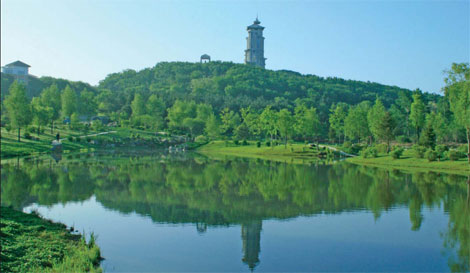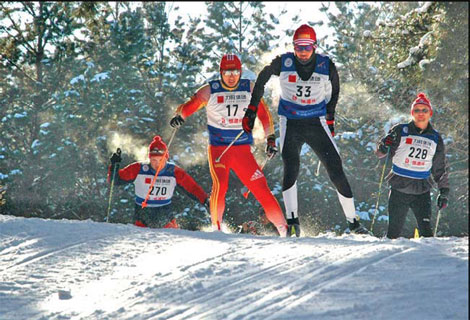Urban breathing space
Updated: 2011-04-22 14:59
By Lu Chang and Liu Mingtai (China Daily European Weekly)
City park at heart of industrial hub positions itself as top tourism attraction

The Jingyuetan Forest Park is now being dubbed as a natural "green lung" for locals. Photos provided to China Daily |
Wang Yao, 28, was fed up with the nerve-wracking pace of the big city and decided to spend the weekend strolling through thick forest, cobble-stoned paths and quaint cottages lined along an azure river.
But Wang did not have to head to some remote area. She was in Jingyuetan, a city park in Changchun of Northeast China's Jilin province that is now being touted as the largest man-made forest park in Asia.
As a traditional industrial base, Changchun used to conjure up images of an industrial powerhouse with roaring motors and rolling smoke against dark skies.
|
|
But now, thanks to years of green efforts, that bleak stereotype has changed and the Jingyue Economic Development Zone authorities are determined to build the area into one of Changchun's top green tourism and investment destinations.
Many tourists like Wang are already heading to Jingyuetan forest park to spend the weekend.
Located in the Jingyue Economic Development Zone in the southern part of Changchun, the park is only 18 km away from the central city, covering about 100 sq km of forestland.
The original aim behind the development zone was to protect the valuable forest. But with an improvement in ecological system, the park is now being dubbed as a natural "green lung" for locals.
In the zone's south is the Xinlicheng Reservoir. With a water area of 62 sq km, the reservoir is a major source of drinking water for the city. The Yitong River, the largest river in Changchun, also flows west of the zone.
Guan Shusen, director of the administrative committee of the Jingyue Economic Development Zone, says a good ecological environment is the basis for a region's sustainable development.
"The zone creates a paradise for eco-tourism through green forests, pure water and many kinds of sports for urbanites," Guan says.
In 2006, the zone invested 270 million yuan (29 million euros) into turning 518 hectares of farmland back into forest, resulting in a fundamental change in the area's environment.
Local authorities have also tried to diversify the species of trees at the Jingyuetan Forest Park in the past five years. The park has become home to 84 species of wild animals and more than 30 tree species such as cherry, plum, maple, red pine and larch.
Unlike other development zones in the country, the area is specially designed for ecological protection, tourism, high-end real estate, and research and development.
"Our plan for the future is to shift from purely tourism to high-end modern services, focusing on the cultural industry," Guan says. "We will further expand the scale of investment and bring more projects to the zone."
The projects will focus on pillar industries such as tourism, education, film production and technology, Guan says.
According to the zone's development blueprint for 2015, the output of its cultural industry is expected to reach 50 billion yuan.
Apart from the forest park, the development zone is also home to the Manchukuo palace museum and the Changchun Film Studio amusement park.
The palace museum was the residence of the puppet Manchukuo emperor Puyi during the Japanese invasion in the 1930s and 1940s. The Changchun Film Studio is the cradle of New China's movie industry.
Several research and higher learning institutes such as the Northeast Normal University, Jilin University of Agriculture, Jilin Academy of Agricultural Sciences and the Northeast China Agricultural Innovation Center are also located here.
With the support from these institutions, a high-tech industry featuring software development, agricultural, biological and pharmaceutical research is also taking shape in the area.
Park for all seasons
Tourism: Jingyuetan has become one of northern China's most popular getaways for enjoying spring greenery, escaping the summer heat, admiring the leaves of autumn and reveling in winter sports.
At the center of the Jingyuetan Forest Park, mountains surround a crescent-shaped lake. Legend has it that the Queen Mother summoned the Seventh Fairy back to heaven. Reluctant to leave earth, she shed two drops of tears. These tears of sadness fell to earth, one onto the regions of Nantou in Taiwan to become the famous Sun Moon Lake, and the other becoming Jingyue Lake. The regions of Nantou and Changchun have a close relationship because of this legend.
First-timers to Jingyuetan can explore a range of activities, ranging from a cable car ride for a view of the pine trees or swinging a club for a forest golfing experience, to a day of fun snow-sledding in winter.
The park is sprinkled with blossoming flowers in spring. In summer, it offers a quiet retreat for people to escape from the heat and city life. Boating on the lake, rafting on the streams and cycling through the shaded lanes are ways to relax. In autumn when yellow and red leaves enrich the park's color, it offers an ideal venue for photographers to catch the sight of nature's fading beauty.
In winter, tourists can take part in winter sports at the Jingyuetan Forest Park. There is a 50,000 sq m ski resort, with slopes for learners, amateurs and professionals.
There is also a 660,000 sq m golf course. Designed by US golf design company JMP, this is touted as the only golf facility surrounded by forests in China.
Exotic sports: Jingyuetan has also held many exotic sports with Vasaloppet and Lidingoloppet, in particular, proving a strong pull for tourists and sport lovers.
The Vasaloppet is a traditional cross-country skiing sport in Sweden. Nordic Ways, a company engaged in promoting traditional Scandinavian sports, brought the sport to Changchun in 2003.
Economic and trade cooperation conferences have been held in conjunction with the festival since its second session.
The skiing competition has generated more than 60 billion yuan in overseas investment. The General Administration of Sports has also invested 6 million yuan in building Asia's largest cross-country skiing base in Jingyuetan, including athlete hotels, fitness gyms and racing tracks.
Opening every Jan 2, the event includes a number of cross-country ski tournaments of the International Ski Federation as well as events for the disabled, university students and children.
About 750 athletics attended the first Vasaloppet China in January 2003 and seven years later, the event saw more than 20,000 people from more than 20 countries participating.
In addition to attracting professionals and amateurs, the event is also a festival. Locals and tourists can take part in activities including the Vasaloppet Night carnival and the Miss Vasaloppet Angel beauty contest.
Top international competition have since been held, including the FIS World Cup, Far East Cup Marathon Cross-country Race and FIS Cross-country points race.
Lidingoloppet, another Swedish sport, was introduced to Jingyuetan in 2008.
Held in June every year, the Lidingoloppet China, or Jingyuetan Lidingoloppet Festival, is a cross-country racing event ranging from 2.5 to 30 km in distance, allowing both professionals and the general public to participate.
Held in the forests of Jingyuetan, Vasaloppet and Lidingoloppet are now seen by the Changchun government as an effective means to promote a healthier way of life among locals and attract tourists from the rest of the country.
E-paper

Pearl paradise
Dreams of a 'crazy' man turned out to be a real pearler for city
Literary beacon
Venice of china
Up to the mark
Specials

Power of profit
Western companies can learn from management practices of firms in emerging economies

Foreign-friendly skies
About a year ago, 48-year-old Roy Weinberg gave up his job with US Airways, moved to Shanghai and became a captain for China's Spring Airlines.

Plows, tough guys and real men
在这个时代,怎样才"够男人"? On the character "Man"

